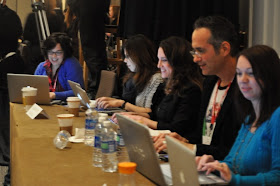Simon and Schuster art director Laurent Linn introduces the wildly awesome group that is the
Book Maker's Dozen!
I'm going to share ONE comment from each person, but boy, are we lucky to have all these amazing illustrators on one stage. I hope there are no stray meteors over Manhattan this morning.
Laurent: WHO ARE YOU?
John Rocco: Originally the idea for the Book Maker's Dozen came out of a show that John Bemelmans Marciano put together for the Brooklyn library called Drawn in Brooklyn, which featured 36 Brooklyn illustrators. We had so much fun, we wanted to keep things going.
Laurent: Do you use it as a critique group? Or more like an artist commune?
Rocco: Yes, we all live together in a one-bedroom on the Lower East Side. No, it's more about having strength in numbers for events, things like that.
Yaccarino: It's more like the mafia, really.
Laurent: Tell me how you deal with rejection?
Ruzzier: In 4th grade I really liked this little girl named, Valentina, but I was too shy, it didn't work out. Now I can take any rejection. What do you do? What does anybody do? You cry a little for a few days, and then you try to get the project rejected by the next person.
Laurent: When you're thinking about projects to create on your own, or promotional//marketing materials how do you find inspiration for those?
Alko: I love to browse bookstores, like Books of Wonder. As far as trends, I do occasionally like to look at Facebook and blog reviews to see what sorts of books are getting mentioned. I do like to get out of the studio to gather information and get inspired.
Laurent: When you are coming up with new ideas or have a manuscript to illustrate, how much do you think about the market viability vs. just wanting to do the project?
Brown: I want to make books that people will read, so I do think some on market viability. If you want to be in this business for a long time, you kind of have to be an idea factory, you can't invest everything in just one idea, or that's the only book you'll make. But by the time you recognize a market trend, it's too late, like my next book, ROBOVAMPIRES DESTROY THE EARTH.
Laurent: What's your process for creating characters?
Leijten: I sketch and sketch, sometimes I make a little 3D character out of wood putty or fabric, it's important to see how a character stands and what sort of emotions you can see in a little model's body language.
Helquist: I use a lot of reference for drawing costume and architecture, but draw the characters from my head.
Laurent: What if you have to do accurate drawings, for nonfiction, how do you do prepare art for those types of books?
Floca: I didn't mean to do books that needed accurate, researched drawings, but the more research you do, the more things you learn and questions you ask and you want to learn how things work, so researching gets increasingly more complex and time consuming.
"I'm trying to finish my latest book now without learning ANYTHING ELSE."
Laurent: How do you find a style or styles to work in?
Qualls: When you're starting out, trying to be an artist, the impulse is to take an academic approach. Now I try to do what comes naturally. But somewhere along the way you start to do what comes naturally. Every book I try to try out new things, or do subtle changes to the way I work. I hope to take my work a little further in terms of style and direction, it's important to be excited about your work and process.
Laurent: Do you have different mind sets or approaches when writing and illustrating a picture book vs. just illustrating?
Yaccarino: It's a very different experience. When you are writing AND illustrating, you're doing all the heavy lifting. Only illustrating is a more relaxed feeling, I can lavish 100% attention on the art alone.
Laurent: A book is a collaboration, what is it like to be art directed and edited?
Dave Gordon: It's something you get used to. If I feel I'm being over-edited in the writing, I focus on what I love and what's working as an illustrator.
Laurent: Some of you have different creative outlets besides books. Illustrating and writing is your passion and focus, but what else do you do?
Sophie Blackall: I like to do everything at the same time, there's not a whole lot of sleep. As much as illustrating children's books is my first love, there are increasingly more things you can't put in a picture book like cigar smoke, taxidermy, blood... And sometimes it's fun to do something without any art directions (that's where Missed Connections comes in.)
Laurent: Tell us about juggling family life, a job, and your illustration career. How do you achieve balance?
John Bemelmans Marciano: As far as organizing the day, it's a daily struggle. I've always worked at home, but after having a child, it was impossible! Unless you have a metal door that you can shut and lock. I finally have an outside studio, the downtime alone on the walk to or from the studio is inspiring.
All thank John Rocco for organizing this group. John says he was just desperate for friends.





 Ginger Knowlton is the Executive Vice President of Curtis Brown Ltd. and represents many writers and illustrators of children's books.
Ginger Knowlton is the Executive Vice President of Curtis Brown Ltd. and represents many writers and illustrators of children's books.









